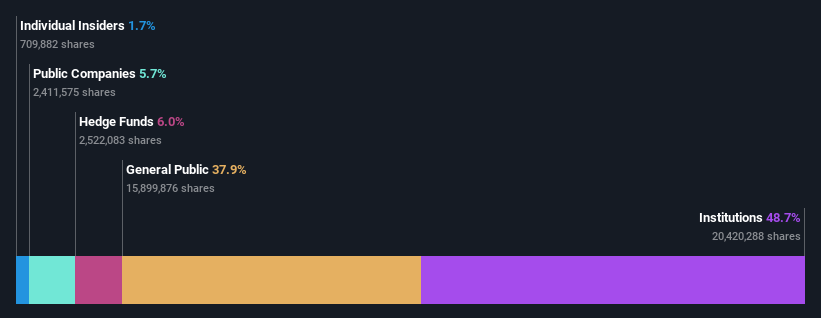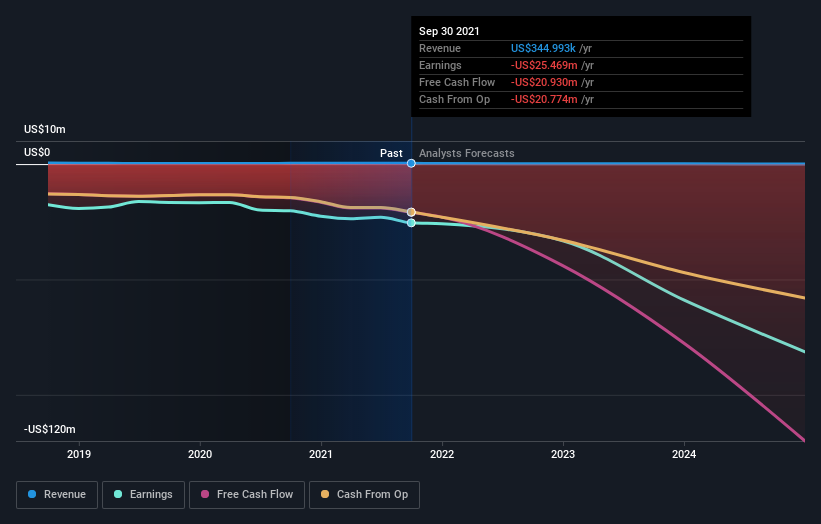Are Institutions Heavily Invested In Cardiff Oncology, Inc.'s (NASDAQ:CRDF) Shares?
A look at the shareholders of Cardiff Oncology, Inc. (NASDAQ:CRDF) can tell us which group is most powerful. Institutions often own shares in more established companies, while it's not unusual to see insiders own a fair bit of smaller companies. Companies that have been privatized tend to have low insider ownership.
Cardiff Oncology is not a large company by global standards. It has a market capitalization of US$294m, which means it wouldn't have the attention of many institutional investors. In the chart below, we can see that institutional investors have bought into the company. Let's delve deeper into each type of owner, to discover more about Cardiff Oncology.
See our latest analysis for Cardiff Oncology
What Does The Institutional Ownership Tell Us About Cardiff Oncology?
Institutional investors commonly compare their own returns to the returns of a commonly followed index. So they generally do consider buying larger companies that are included in the relevant benchmark index.
We can see that Cardiff Oncology does have institutional investors; and they hold a good portion of the company's stock. This can indicate that the company has a certain degree of credibility in the investment community. However, it is best to be wary of relying on the supposed validation that comes with institutional investors. They too, get it wrong sometimes. It is not uncommon to see a big share price drop if two large institutional investors try to sell out of a stock at the same time. So it is worth checking the past earnings trajectory of Cardiff Oncology, (below). Of course, keep in mind that there are other factors to consider, too.
It would appear that 6.0% of Cardiff Oncology shares are controlled by hedge funds. That's interesting, because hedge funds can be quite active and activist. Many look for medium term catalysts that will drive the share price higher. Janus Henderson Group plc is currently the largest shareholder, with 8.4% of shares outstanding. Caxton Associates LP is the second largest shareholder owning 6.0% of common stock, and Pfizer Inc. holds about 5.7% of the company stock.
A closer look at our ownership figures suggests that the top 14 shareholders have a combined ownership of 50% implying that no single shareholder has a majority.
Researching institutional ownership is a good way to gauge and filter a stock's expected performance. The same can be achieved by studying analyst sentiments. There are a reasonable number of analysts covering the stock, so it might be useful to find out their aggregate view on the future.
Insider Ownership Of Cardiff Oncology
The definition of an insider can differ slightly between different countries, but members of the board of directors always count. Company management run the business, but the CEO will answer to the board, even if he or she is a member of it.
Insider ownership is positive when it signals leadership are thinking like the true owners of the company. However, high insider ownership can also give immense power to a small group within the company. This can be negative in some circumstances.
Our most recent data indicates that insiders own some shares in Cardiff Oncology, Inc.. As individuals, the insiders collectively own US$5.0m worth of the US$294m company. Some would say this shows alignment of interests between shareholders and the board. But it might be worth checking if those insiders have been selling.
General Public Ownership
The general public, who are usually individual investors, hold a 38% stake in Cardiff Oncology. This size of ownership, while considerable, may not be enough to change company policy if the decision is not in sync with other large shareholders.
Public Company Ownership
We can see that public companies hold 5.7% of the Cardiff Oncology shares on issue. We can't be certain but it is quite possible this is a strategic stake. The businesses may be similar, or work together.
Next Steps:
It's always worth thinking about the different groups who own shares in a company. But to understand Cardiff Oncology better, we need to consider many other factors. Consider for instance, the ever-present spectre of investment risk. We've identified 5 warning signs with Cardiff Oncology (at least 2 which are a bit concerning) , and understanding them should be part of your investment process.
If you are like me, you may want to think about whether this company will grow or shrink. Luckily, you can check this free report showing analyst forecasts for its future.
NB: Figures in this article are calculated using data from the last twelve months, which refer to the 12-month period ending on the last date of the month the financial statement is dated. This may not be consistent with full year annual report figures.
Have feedback on this article? Concerned about the content? Get in touch with us directly. Alternatively, email editorial-team (at) simplywallst.com.
This article by Simply Wall St is general in nature. We provide commentary based on historical data and analyst forecasts only using an unbiased methodology and our articles are not intended to be financial advice. It does not constitute a recommendation to buy or sell any stock, and does not take account of your objectives, or your financial situation. We aim to bring you long-term focused analysis driven by fundamental data. Note that our analysis may not factor in the latest price-sensitive company announcements or qualitative material. Simply Wall St has no position in any stocks mentioned.


